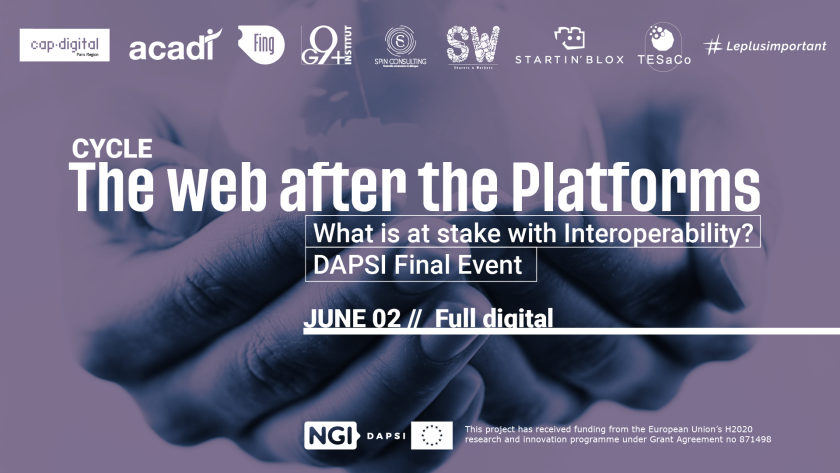
What is at stake with Interoperability?
Standards have been defined to build a different web, to give back control of data usage to actors, to maintain control of industrial data and to allow for fair competition conditions. However, these opportunities are not well known by the entrepreneurs who are likely to seize them, support them and leverage their potential, neither by the public actors likely to encourage them, nor, more widely, by citizens.
This event proposes to discuss the implications of these changes based on the input from various use cases.
How do businesses boost or strengthen their market access? How can these standards be used as a weapon of European digital fairness? What changes can be made to the rules for managing personal data? What kind of legal frameworks should be built? How can we educate citizens and actors to manage their data? Finally, how will these transformations affect the organization of businesses and institutions?
We will explore all these issues by mobilising European experts and stakeholders of these topics. We will also shed light on the seven winning projects of the European challenge DAPSI (Data Portability & Services Incubator) proposed by the European initiative NGI (Next Generation Internet – funded by the European Union in the framework of the H2020 programme).
The conference is a 100% digital event. It is addressed to all European stakeholders in digital innovation (large companies, public actors, academics, innovative start-ups & SMEs, representatives of associations and civil society and journalists, etc.). It will be held in English and French. Simultaneous translation will be available.
This event is the kick-off of a cycle of four digital webinars that will focus on different sectoral use cases, to be organized in 2021.
THE AGENDA
Morning (09:45-12:00): Interoperability as a means for rebuilding the web, with Gilles Babinet (co-Chairman at French Digital National Council and Digital Champion at the European Commission), Jean-François Abramatic (ex Inria, ex W3C), Alain Assouline (CINOV -Numerique), Antoine Garnier (IDSA).
Afternoon (13:30-16:45): DAPSI FINAL EVENT – Presentation of the 7 winning DAPSI projects, roundtables with the DAPSI project leaders. The first roundtable will focus on the issues of uses, user experience & adoption, the second one on technology transfer and scaling up issues.
Focus on the 7 innovations for data portability from the DAPSI program:
- Alias Identity: ALIAS enables the next generation of applications to happen, by automating GDPR portability for applications developers.
- Own your Data – Digital Immunization Passport (DIP): The main focus of this project is on Data Interoperability & Compatibility through establishing interfaces between health industry and individuals as well as pushing forward on standardized interfaces for PDSs.
- Audriga – OpenXport: The OpenXPort project will start by providing two main results. First, a best practice document which supports developers and policymakers to address and shape the future of data portability will be created. Second, an Open Source framework for the portability of core PIM data types will be defined. Given the ubiquity and key role of PIM data and prior work in this field, such an open framework has a huge potential for bringing data portability into widespread practice and also to serve as a blueprint for data portability in other domains.
- Dpella: a tool that perturbs data analyses’ results with carefully calibrated randomized noise to protect the privacy of individuals with mathematical guarantees, while providing information about the accuracy of the results. This project explores the possibilities for this technology to enable governments and companies to produce open, secure, and public data analyses from private datasets.
- Gridpocket – Oratorio: The ORATORIO project consists also in the development of a platform that will store different types of energy data of consumers and prosumers (consumption/production and IoT data in this prototype): consumption data, energy profiles, analytics of use, data of IoT devices, electric vehicle data.
- Digita BV: software and services that allow organizations to easily connect to Solid-based personal data sets.
- IMEC – Prov4ITDATA: This project offers an improved solution that is fully transparent and has fine-grained configuration to improve interoperability with other data models by exploiting and advancing the existing open-source tools RML.io and Comunica and showing its extensibility by directly applying it to the Solid ecosystem.
Registration
Please register by clicking here.

